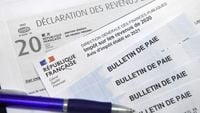The deadline to declare 2024 income is approaching, with the 2025 declaration campaign starting on April 10, 2025. Taxpayers need to prepare for various deadlines depending on their departments, with penalties for late submissions looming.
This year, the French tax authorities are reminding citizens that the declaration process is mandatory, even for those with low or no income. The 2025 campaign for filing income tax returns will commence on April 10, 2025, allowing taxpayers nearly two months to submit their forms. The last date for online submissions varies by region, with residents of departments 1 to 19 (Ain to Corrèze) having until May 22, 2025, while those in departments 20 to 54 (Corsica to Meurthe-et-Moselle) must file by May 28, 2025. Finally, residents of departments 55 to 976 (Meuse to Mayotte) have until June 5, 2025, to complete their declarations.
For those opting for the traditional paper method, the deadline is set for May 20, 2025, regardless of the department. The postal date will determine the validity of these submissions.
Taxpayers should also be aware of the consequences of late filings. A 10% penalty can be applied from the first day of delay, which increases to 20% if a formal notice is issued and the declaration is submitted within 30 days. If the declaration is filed more than 30 days after the notice, penalties can reach 40% of the tax owed. This strict enforcement aims to curb tax fraud and ensure compliance.
One significant change in the 2025 tax landscape is the adjustment to tax credits. The finance bill for 2025 includes modifications to the home service tax credit, which allows taxpayers to deduct 50% of certain home service expenses, up to €20,000 per year, depending on individual circumstances. This year, taxpayers will need to specify whether the service provider is an employer, a service organization, or a representative to qualify for the credit. This change aims to enhance transparency and control over public finances, as this tax credit is one of the most expensive for the state concerning income tax.
In 2023, the General Directorate of Public Finances corrected nearly €15.2 million in erroneous or falsified tax returns, highlighting the importance of accuracy in declarations. With tax regulations becoming increasingly complex, errors are more common, and the rise of online scrutiny through social media and second-hand sales platforms has intensified oversight.
Taxpayers are encouraged to utilize the new online simulator, which allows individuals to calculate their 2025 tax amount and tax reference income based on the new income brackets. The income tax scale has been adjusted by 1.8% across all brackets, reflecting inflation excluding tobacco for 2024. The first bracket remains at 0% for incomes up to €11,497, while the second bracket at 11% applies to incomes from €11,497 to €29,315. The third bracket at 30% is for incomes from €29,315 to €83,823, the fourth at 41% for incomes from €83,823 to €180,294, and the fifth bracket at 45% for incomes exceeding €180,294. This adjustment is expected to prevent around 619,000 taxpayers from becoming liable for income tax.
As the deadline approaches, taxpayers should prepare their documents and ensure they understand the implications of the new tax rules. With the campaign set to begin soon, it’s crucial to stay informed about the specific deadlines and requirements based on individual circumstances. The tax authorities have made resources available online to assist taxpayers in navigating this process.
In summary, the 2025 income declaration campaign is a critical period for French taxpayers. With the deadlines looming and significant changes in tax credits and penalties for late submissions, it’s essential to be proactive and informed. The government’s focus on transparency and control over tax credits reflects broader efforts to enhance the integrity of the tax system, ensuring that all contributors meet their obligations.
Taxpayers should mark their calendars and prepare to submit their declarations on time to avoid penalties and take advantage of available tax credits. As the deadline approaches, the call to action is clear: prepare, declare, and comply.









